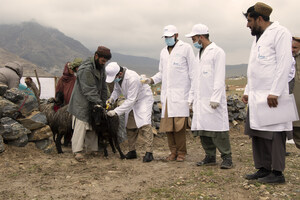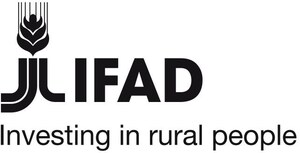IFAD report predicts steep drop in African staple crops by 2050, prompting urgent call for adaptation funding at COP26
ROME, Oct. 27, 2021 /PRNewswire/ -- Staple crops in eight African countries could decrease by as much as 80 percent by 2050 in some areas if temperatures continue to rise due to climate change, according to a report released today by the UN's International Fund for Agricultural Development (IFAD). This could have a catastrophic impact on poverty and food availability unless there is an urgent injection of funding to help vulnerable farmers adapt how and what they farm.
The report What Can Smallholder Farmers Grow in a Warmer World? Climate Change and Future Crop Suitability in East and Southern Africa shows that if no changes are made to agricultural practices or global policies, erratic weather patterns, drier conditions and an increase in temperatures by 2°C will have a devastating impact on yields of staple and cash crops grown by small-scale farmers in parts of Angola, Lesotho, Malawi, Mozambique, Rwanda, Uganda, Zambia and Zimbabwe. For example, in a worst-case scenario, the annual maize crop per household in the Namibe province in Angola could decrease by 77 percent by 2050.
IFAD warned that COP26 will fail to achieve a lasting impact if world leaders continue to prioritise mitigation and neglect investments in climate adaptation.
"Mitigation and adaptation are like the two wings of a bird, we cannot continue flying on one wing," said Dr. Jyotsna Puri, IFAD's Associate Vice President of the Strategy and Knowledge Department, which produced the report. "While efforts in mitigation are essential, they will take two or three decades to bear fruit. We must urgently invest in adaptation now so that small-scale farmers, like the ones in this study, can continue to grow the crops they rely on for their incomes and to feed their nations."
According to the report's findings, the impact of climate change will inevitably force fundamental changes to local crop choices and agricultural practices by 2050 in these countries. Recommended investments in adaptation include:
- Planting alternative crops and crop diversification.
- Planting different varieties, including locally adapted varieties.
- Using different planting techniques, with improved seeds and plant material.
Small-scale farmers in developing countries are the most vulnerable and the least able to cope with climate change. They produce a third of the world's food but receive less than 2 percent of the funds invested globally in climate finance.
Contacts:
Antonia Paradela
[email protected]
SOURCE International Fund for Agricultural Development

Related Links
WANT YOUR COMPANY'S NEWS FEATURED ON PRNEWSWIRE.COM?
Newsrooms &
Influencers
Digital Media
Outlets
Journalists
Opted In






Share this article